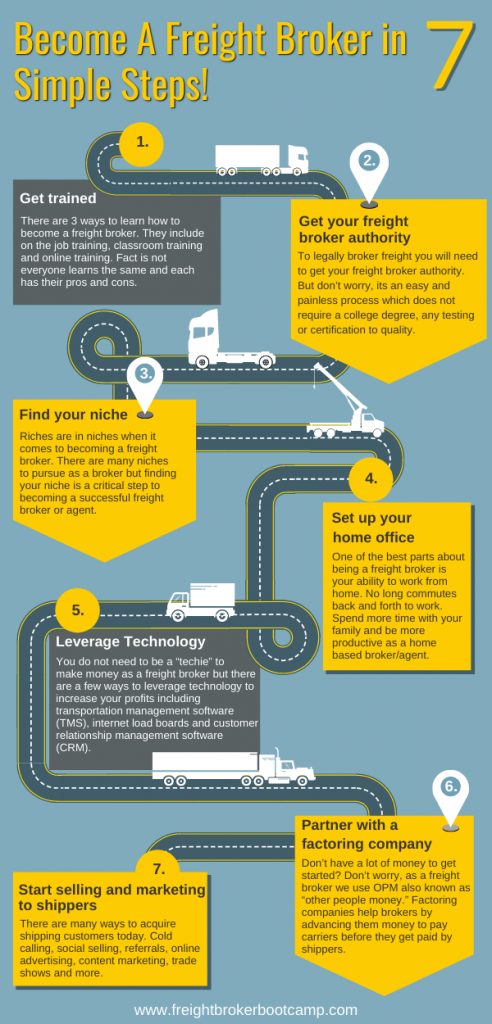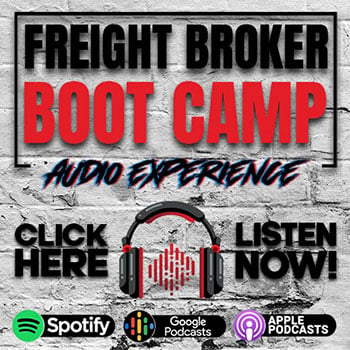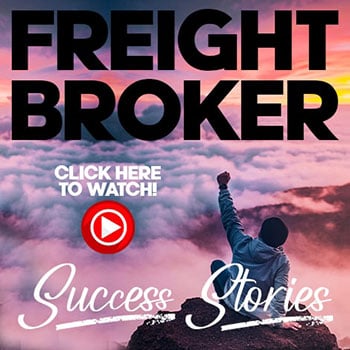The primary goal of this website is to teach people how to become a freight broker or a freight agent.
There are a variety of resources including both free freight broker training videos and articles. As well as my online freight broker and freight agent training program, know as Freight Broker Boot Camp.
This post is designed to help guide you through 7 simple steps to become a freight broker.
- What is a freight broker?
- Step 1 – Get trained as a freight broker or freight agent
- Step 2 – Get your freight broker authority / freight broker license
- Step 3 – Find your freight broker niche
- Step 4 – Set up your freight broker home office
- Step 5 – Leverage freight broker software
- Step 6 – Partner with a freight broker factoring company
- Step 7 – Start selling and marketing to shippers
- Breakdown of How Freight Brokers Make Money
- Is Becoming A Freight Broker Worth It?
Before we go into the 7 steps to become a broker, let’s quickly define what is a freight broker and the difference between freight brokers and freight agents.
What is a freight broker?
A freight broker is a licensed “property broker” who helps shippers manage and move freight from point A to point B. To become a broker, you need to be licensed by the FMCSA ( Federal Motor Carrier Safety Administration ).
Freight brokers are sometimes referred to as truck brokers, trucking brokers, shipping brokers, logistics brokers, and/or transportation brokers.
It’s important to note that freight brokers are not motor carriers or freight forwarders because freight brokers do not take possession of and/or physically transport the freight themselves. Instead, they hire trucking companies to pick up and deliver the freight for their clients.
The main tasks of a broker include finding carriers, dispatching drivers, providing shipper freight quotes, invoicing shippers, paying your motor carriers and the list goes on.
Now, let’s dive into the 7 steps of how to become a freight broker with no experience.

Step 1 – Get trained as a freight broker or freight agent
The first step in how to become a freight broker to becoming a broker is to get trained.
There are 3 primary ways to learn how to become a freight broker:
They include on-the-job training, live classroom training, and online training (which is usually self-study)
Fact is, not everyone learns the same and each has its pros and cons.
On-the-job broker training, provides hands-on experience and the advantage that you can earn while you learn. But it also takes the longest and has the least amount of flexibility.
Classroom broker training courses are perfect for anyone who likes to learn from a teacher, however, classroom training can be more costly, can require travel, and lack scheduling flexibility. Sometimes referred to as a freight broker school.
Online broker training can be done online, at your own pace, and is usually the least expensive training option. A great example of this is an online freight broker course.
Before deciding which is the best for you, take a deeper dive and look at the pros and cons of all of them.
Not long ago I wrote an article that has become very popular that might help.
Click Here – #1 Guide to Freight Broker Training in 2024
Step 2 – Get your freight broker authority / freight broker license
To become a freight broker and legally broker loads in the United States you will need to get your freight broker authority.
But don’t worry, it’s an easy and painless process that does not require a college degree, any testing, or certification to qualify.
Become A Licensed Freight Broker in 4 Just Simple Steps
To start your own brokerage, new brokers need to complete a few legal requirements listed below:
Step 1 – complete and file your FMCSA OP-1 Form.
Step 2 – designate a process agent and file your BOC-3 agent processing form.
Step 3 – get your broker surety bond (also called BMC-84 bond) or your broker trust (BMC-85).
Step 4 – complete your Unified Carrier Registration / UCR
For further information, check the registration page of the FMCSA: https://www.fmcsa.dot.gov/registration/broker-registration
During this process, you’ll also receive your motor carrier number (MC) and USDOT number.
When it comes to freight broker surety bonds, people sometimes ask me if their credit score will have an effect on their premiums. The answer is yes, your credit score can affect your premiums.
Read the full article on 5 things you need to know about freight broker bonds.
Keep in mind that there are costs involved to get your freight broker authority and the processing time can take 4-6 weeks.
First you will need to form a Corporation or LLC but that can all be done online.
LLC stands for limited liability company and it’s a recommended business type for any freight broker company.
Other than that, you don’t need much to get started as a freight broker. Both general liability insurance or contingent cargo insurance are optional for startups. When you are in the logistics industry, having some kind of insurance is a good idea, in case anything goes wrong.
While getting your freight broker authority is crucial to becoming a freight broker, it’s not needed to become a freight agent.
That’s why many people decide to start as independent freight agents first and then become a freight broker later.
NOTE: As a part of my online Freight Broker Boot Camp online training course we teach you how to apply for your freight broker authority plus we train and support you on how to start making money as a broker.
Step 3 – Find your freight broker niche
Riches are in niches, in the journey of how to become a freight broker.
There are many niches to pursue as a broker, so finding your niche is a critical step to becoming successful.
I’ve told the story many times about how I found my freight niche and how I was able to generate over $1 million in sales my first year in business. All with no prior logistics or trucking related experience.
Keep in mind that you aren’t bound to just one freight niche forever. Once you are successful in a niche, you can expand to others.
But when you are just starting out, skilled brokers know that picking a niche will significantly increase your odds of success.
There are 4 primary ways to find your niche for your freight brokerage business:
1) Equipment type
Niching by equipment type can mean to only work with vans or refrigerated trucks for example. Or to focus on vans, reefers, flatbeds, step decks, as well as many other specialized types of trucking equipment.
2) Product type
Product types could mean steel, produce, gas and oil, bottled beverages, heavy equipment, and the list goes on.
3) Based on geography/lane
You can also specialize and niche down by geography, region, or even specific freight lanes or corridors. For example Chicago outbound freight, northeast outbound freight, or cross border freight.
4) Hybrid approach
The hybrid approach combines two or more of the 3 strategies identified above. For example, your niche could be Northeast outbound van freight or CA to TX flatbed freight just to name a few.
Click Here – How Much Does it Cost to Become A Freight Broker 2024
Step 4 – Set up your freight broker home office

One of the best parts about being a freight broker is your ability to work from home.
There are no long commutes back and forth to work. You get to spend more time with your family and be more productive as a home-based broker or agent.
I’ve been an entrepreneur for about 25 years and during my career, I have worked from home for almost half of that time and I love it.
I truly enjoy working from home and while it’s not for everyone, I think the pros far outweigh the cons.
Pros of working from home as a freight broker or freight agent include:
-More independence
-Fewer expenses
-No commute
-Increased productivity
-More work flexibility
-Fewer office distractions
-Increased job satisfaction
-More work-life balance
-Work on your own hours
Cons of working from home as a broker or agent including:
-Increased isolation
-Risk of overworking
-Distractions at home
-Workplace disconnect
-Self-management can be hard work
If working from home is absolutely not an option for you, you could rent a small office space where you manage the day-to-day operations.
Once you become a freight broker, you are in charge. So, it’s your choice where you work from.
But most freight brokers startups decide to work from home. That’s why I wrote a full article on how to set up your home office that might be helpful as you start your own freight brokerage.
Step 5 – Leverage freight broker software
You do not need to be a “techie” to make money as a broker but there are a few ways to leverage technology to increase your profits.
They fall into 3 different categories: 1) transportation management software (TMS), 2) internet load boards, and 3) customer relationship management software (CRM).
A freight broker TMS will help you to keep track of all your loads, orders, rates, carriers, and more.
A freight broker CRM is a place to manage all of your customer and prospect data.
Internet load boards are online hubs where motor carriers share truck capacity and freight brokers share load capacity and then collaborate and work together to create mutually beneficial relationships.
That’s why load boards are invaluable when you become a freight broker with no experience. It helps you to find and develop relationships with carriers that you can partner with to move your customer freight.
There are countless load boards out there that’s why I collected my top 5 load boards in an article below.
As you can see, to become a broker you really don’t need much technology other than an internet load board or two.
But as you begin to ramp up your sales efforts and move more freight, you are definitely going to want to embrace technology.
The good news is, there are tons of options when it comes to freight broker software. See the links below to get into more detail based upon your specific needs.
Top 30 Freight Broker Software For 2024
Top 5 Load Boards For Freight Brokers in 2024
Top 5 Sales CRM’s For Freight Brokers in 2024
Step 6 – Partner with a freight broker factoring company
Do you want to become a freight broker but don’t have a lot of money to get started?

Don’t worry, as a broker you can use OPM – also known as “other people’s money.”
That’s why factoring is so popular with freight brokers. Factoring companies help freight brokers by advancing them money to pay carriers before they get paid by shippers.
Freight broker factoring is a form of financing where you sell a shipper invoice to a factoring company, which then advances you up to 95% of the invoice to pay your motor carrier and basic operational cost.
Without factoring most brokers would never be able to scale their business to 7 figures because in many cases trucking companies will require payment from the broker before the shipper actually pays the broker.
This is often the case in business and while I don’t recommend factoring as a long-term strategy, it is a powerful strategy for startups until you can acquire bank financing.
More details on how factoring works and where you can find a factoring company below.
Click Here – What is Freight Broker Factoring? Ultimate Guide For Brokers
Step 7 – Start selling and marketing to shippers
The final step to becoming a broker is to start selling and marketing your services.
There are many ways to acquire shipping customers today. Cold calling, social selling, referrals, online advertising, content marketing, trade shows, and more.
Most freight brokers start with cold calling as their primary strategy because it’s the fastest way to start having conversations with potential shippers.
But it definitely isn’t the only way.
Those who have industry experience and contacts like to get their first shipping clients from referrals.
Regardless of which channel or strategy you choose, learning how to sell is one of the most valuable skills for a broker or agent.
Fact is, there are top salespeople and freight agents that make more than owners and CEOs in the freight industry.
Why?
Because they understand how to get and retain clients and without that there is no business.
Here are some broker sales training links that I think you will enjoy.
The Ultimate Guide to Freight Broker Sales!
Freight Broker Sales Training – 8 Killer Sales Questions that Every Broker Needs to Know
Freight Broker Sales Training – How to Overcome the Price Objection
7 Freight Brokers Sales Tips on How to Get Past the Gatekeeper
Freight Broker Sales vs Marketing
Freight Broker Sales Training – Turning 1 Customer into 10 Customers
I’ve said it before and I’ll say it again. Learning to sell is the most valuable skill in the world for the average person to earn a 6 figure income.
There are many other important facets to becoming a successful freight broker but sales are definitely high on the list.
Breakdown of How Freight Brokers Make Money
A widget manufacturer hires a licensed freight broker to move widgets from Buffalo, NY to Atlanta, GA for $1,800.
The broker then finds a trucking company willing to transport the load for $1,500.
This leaves a gross profit of $300 for the broker. Freight broker profit margins typically ranges from 10-20% of the overall shipment value.
As you can see, the broker business can be a very lucrative business. Here’s a post and video sharing how much top freight brokers make per year.
If you aren’t quite ready to deal with the legal requirements of becoming a freight broker. Including getting your freight broker bond and freight broker authority, you should seriously consider starting as a freight agent (also known as a freight broker agent).
As a freight agent, you don’t need to be licensed and there are no tests or certifications to qualify. A freight agent often acts as an independent sales agent under the freight broker’s license.
Your main tasks would be to find shippers, rate shipments, source carriers, dispatch drivers, and make sure everything happens on time.
Independent freight agents typically earn between 50-70% commission of the profit from any load they originate.
Example: Shipper pays $1,000, the broker pays $800 to the carrier. Leaving $200 in profit. The freight agent would get paid between $100-$140 on that one load.
In this article, I mainly talk about how to become a freight broker but if you are unable to get started as a freight broker, it’s important to note that freight agents do extremely well as seen in these freight agent success interviews.
Is Becoming A Freight Broker Worth It?
It depends. If you are looking for a get rich quick scheme, then probably not. If you are looking to develop the necessary skills and work hard, then to becoming a freight broker is definitely worth it.
Freight brokerage has a bright outlook for those who want to put in the work to build a successful career. Becoming a freight broker has the potential to be very profitable and exciting business.
There is no shortage of business for domestic freight brokering because trucks are responsible for transporting about 72% of all freight tonnage in the United States.
The secret is to set up your firm carefully to avoid incurring any additional expenses or legal issues. Errors in finance, permits, and marketing can cause any organization to fail, and freight brokerage is no exception.
To sum up, becoming a licensed broker isn’t rocket science.
So let the 7 steps from this article guide you to become a freight broker in 2024.
If you are curious and want to learn more about my online freight broker training CLICK HERE!




[…] effective pricing strategies is crucial for sustainable profitability in freight brokerage. When becoming a freight broker, brokers must balance competitive pricing to attract clients while ensuring that rates cover […]
January 22, 2024 at 8:48 amHey, I am new into he business as I am from Pakistan there is an agency who is doing this business and they gonna teach me so I could start making money as freight broker but i have seen your video and that was amazing. I would love to learn about this industry from you as you are already an expert in the field.
I would be glad if you would help me so I could become a successful freight broker like you.
Thanks,
March 11, 2024 at 9:27 amI am ready to get started.
July 8, 2024 at 3:12 pmGreat get enrolled and we are ready to help you get started. http://www.FreightBrokerBootCamp.com 60 day 100% money back guarantee!
July 8, 2024 at 6:00 pmi want to start my own broker business, I listen to your webinar was under the impression its startup costs what exactly do i need to get started
September 12, 2024 at 7:34 pmregards, BECKY
Here you go, this should help. https://freightbrokerbootcamp.com/how-much-does-it-cost-to-become-a-freight-broker-agent/
October 3, 2024 at 11:24 pmI got the seven steps guide, and I want to get started ASAP with the training. How do we start?
December 29, 2024 at 2:51 pmhttp://www.FreightBrokerBootCamp.com 60 day 100% money back guarantee!
January 23, 2025 at 12:57 pmI need to download
June 14, 2025 at 2:40 amSorry just go to http://www.freightbrokerbootcamp.com/7steps
June 24, 2025 at 11:16 am